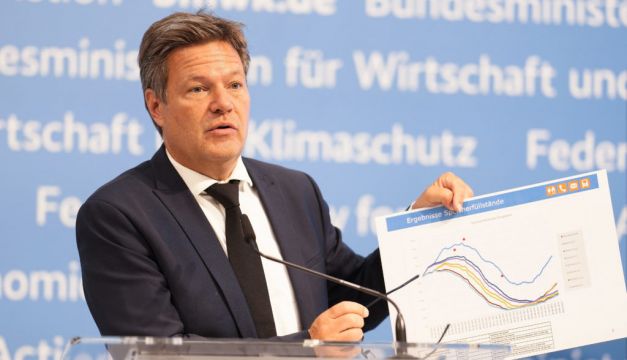Germany has activated the second phase of its three-stage emergency plan for natural gas supplies – saying the country faces a “crisis” and warning that storage targets for the winter are at risk due to dwindling deliveries from Russia.
The government said the decision to raise the level to “alarm” follows the cuts to Russian deliveries made since June 14 and the continued high market price for gas.
The third and highest stage is the “emergency” level.
It said that while gas storage facilities are currently filled to 58% capacity — higher than at this time last year — the goal of reaching 90% by December will not be achievable without further measures.
Economy minister Robert Habeck said in a statement that “the situation is serious and winter will come”.

“The reduction in gas supplies is an economic attack on us by (Russian President Vladimir) Putin,” he said.
“We will defend ourselves against this. But our country is going to have to go down a stony path now.”
“Even if we can’t feel it yet, we are in a gas crisis,” Mr Habeck added.
The government said it had told European partners of the move in advance.
Russia last week reduced natural gas supplies to Germany, Italy, Austria, the Czech Republic and Slovakia just as European Union countries are scrambling to increase storage of the fuel used to generate electricity, power industry and heat homes in the winter.
Russia’s state-owned energy giant Gazprom blamed a missing part sent to Canada for repairs as it cut flows by 60% through the Nord Stream 1 pipeline running under the Baltic Sea to Germany — Europe’s major natural gas pipeline.
Other countries, including Austria and the Netherlands, have launched first-stage warnings about supplies and urged people to conserve energy.
Germany and Italy, two of Europe’s biggest buyers of Russian gas, have called Russia’s gas reductions politically motivated and warned they could further slow the economy.
“We are in an economic conflict with Russia,” said Mr Habeck, accusing Moscow of trying to destroy European unity and the solidarity it has shown with Ukraine.
The cutbacks come on top of gas shut-offs to Poland, Bulgaria, Denmark, Finland, France and the Netherlands in recent weeks.
Germany will not react by cutting off neighbouring countries, Mr Habeck said. Instead, it was urging industry and residents to reduce their consumption as much as possible.
“The prices are already high, and we need to be prepared for further increases,” Mr Habeck said, warning that “this will affect industrial production and become a big burden for many producers”.
Despite that, Germany’s energy industry lobbying group BDEW said it supported the government’s decision.
Calculations show that businesses have already reduced their demand by 8% in recent months. To encourage further savings, the government plans to hold auctions paying large industrial consumers to relinquish their contracts.
The measures being taken, including providing gas distributors and utility companies with large loans to cope with price surges, were necessary to prevent a collapse of energy markets, Mr Habeck said.
Triggering the highest alert level could force Germany to ration gas for industrial customers to spare homes, schools and hospitals and would mean a severe hit to the economy.
Mr Habeck said people could do their part by adjusting their home heating system now and saving up to 15% during the cold months.
“It sounds banal sometimes, but you have to multiply that banality by 41 million households,” he said.







